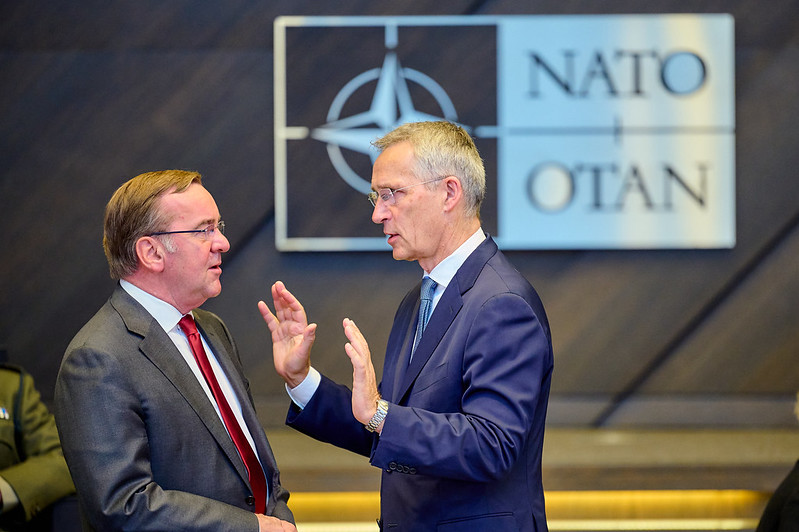December 18th was an odd day during election season, as Germany’s defence minister Boris Pistorius repeatedly heaped credit and praise on other parties. Responding to questions in the Bundestag, Pistorius thanked the Grüne and FDP several times, and gave a special thanks to the CDU for voting to support the government, despite being in opposition. Together, they passed a spending package for the German military worth over 20 billion euros.
Speaking to the press, Pistorius made one thing clear: “This is not a topic for election campaigns.” He also told them that it marked “the highest sum that has ever been recorded” in Germany’s defence spending. The statement speaks for itself in print, but Pistorius said it in a tone full of self-congratulation.
The funding is going towards numerous different projects, although not all of them are transparent to the public. Among other things, the army will receive PULS missile systems, a rocket-firing truck used by the IDF to carry out the genocide in Gaza and made by the Israeli company Elbit Systems. For the air force, several different types of missiles have been ordered, including Patriot guided missiles and Iris-Ts. On top of that, the Bundeswehr will receive various types of digital security software and logistical structures.
The largest expenditures though, were for the German navy, which among other things will be receiving four U-boats to replace Germany’s aging stock, although these will take seven to eight years to be delivered. The emphasis on the navy points to Germany’s concerns in the North Sea, where it considers itself particularly vulnerable to Russian attacks on infrastructure. Late last year, Pistorius was quick to declare the cutting of two communications wires, one of which connected Germany to Finland, as an act of Russian sabotage. It came out several days later that it was likely a Chinese tanker ship dragging its anchor, despite Pistorius’ quick accusations.
The German government is also looking to increase the personnel in the Bundeswehr, which includes Germany’s standing army, navy and air force. Currently at around 180,000 soldiers, the plan is to increase to 203,000, although Pistorius said in the Bundestag that it will likely end up closer to 230,000.
Is Conscription on the Horizon?
Not only is the number of active soldiers increasing, the government is also planning on sending a survey to German citizens of at least 18 years of age, inquiring into their willingness to serve in the military in times of war, as well as any relevant skills they may have. While men are required to fill out the form, women are allowed to as well, if they want to show sport.
While the government states that this is not a reinstatement of mass conscription, which Germany abolished in 2011, it appears to be a clear step in that direction.
For the most part, Germany’s political parties are all sounding a similar note regarding militarisation leading up to this election, with the exceptions of BSW and Die Linke. The CDU’s platform not only includes raising the number of personnel, but also increasing the number of public oaths and other forms of recognition for the military. They see 2% spending of GDP, as required by NATO, as the minimum goal. While this was to be expected, Robert Habeck of the Grüne’s declaration that Germany needs to nearly double its defence spending to 3.5% has turned some heads.
While Germany’s mainstream political parties stand behind this increased militarisation of both state and society, a poll from March 2024 hints that they need to be cautious not to overstep their militarisation push. Asking Germans whether or not they are in favour of reinstating Wehrpflicht (conscription), 52% stated they were in favour and 43% against.
The numbers change noticeably with age: In the 60+ category, 59% of the population is in favour and 37% against, with similar numbers for 45-59 year olds. But the 18-29 year olds, who would mostly be the ones serving, are much less enthusiastic, with only 39% in favour and 59% against. Women in this age group are especially against, 30% in favour compared to 68% against, while young men are 46% in favour.
The same poll breaks support down along party lines, showing that SPD voters would support reinstating conscription by a slim margin, while CDU, AfD and (ironically) BSW voters support it by 67-68%. The poll shows Habeck to be playing with fire however, with only 37% of Grüne voters supporting conscription.
While it’s important to note that currently only the AfD are calling to reinstate the Wehrpflicht, the mixed numbers here show that the idea has limited popularity already (the CDU has already approved the idea internally in response to a members motion, although it’s not in their election programme). It may be another case of the AfD taking a controversial position which the other parties are then quick to copy. While most politicians are taking care to not bring the issue up for the time being, should the current pace of disillusionment in Germany continue a further shift in favour of militarisation in German society appears likely.
It is worth noting that this is a far cry from the situation leading up to the 2003 Iraq invasion, when Gerald Schröder made his opposition to the war a core part of his (notably successful) 2002 election campaign, and tried to talk the Americans out of it while in office. Die Grüne held a similar position at the time.
Ukraine has in many ways marked a shift for German political opinion, including in the 2014 invasion of Crimea, as journalist Franziska Augstein described back in 2015. It is perhaps unsurprising, then, that Putin’s full-fledged invasion of Ukraine has now caused an even larger revival of German militarism among both politicians and populace.
A Rising Far-Right and A Strong German Military
The new funding programs and CDU’s proposals for public loyalty ceremonies take place in the context of a Bundeswehr with both a long and recent history of far-right extremism. In response to questions from Die Linke, the Defence Ministry released information last December showing that 2023 saw 205 extreme right-wing, racist or antisemitic incidents. These led to 62 soldiers getting fired for such infractions, such as using “heil Hitler” chants. Of those fired, 10 were officers. These overall numbers are a slight decrease from the previous year.
It is hard to imagine any good effects coming from a more militarised German state and society. With an increasingly right-wing youth, a stagnant economy and social services falling apart even before the CDU’s next round of austerity, drastically increasing spending in the Bundeswehr means military service could become the easiest way to access state support. Besides that, strengthening spending in institutions that serve both as recruitment grounds and weapons training for fascists is hardly a comforting thought.
As the CDU are set to come to power, and the AfD seem to become more popular with every election, increasing the strength of the German military raises the obvious question of who will be leading it in 10 years time. It would not be the first time that a social democratic or conservative government paved the way for a dictatorship with military drills and wads of cash for tanks.




